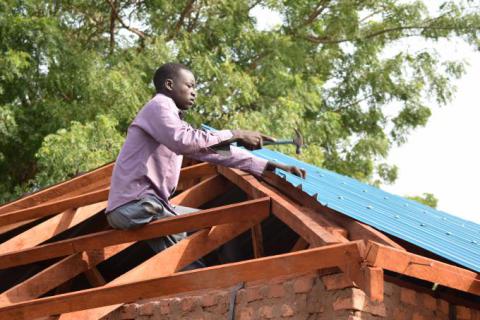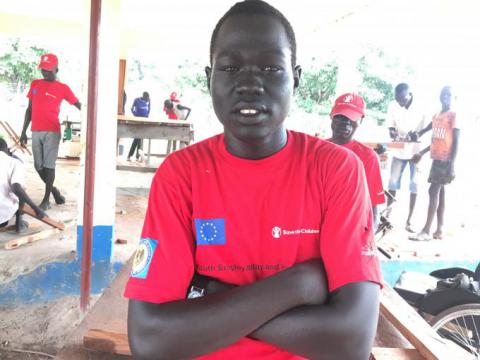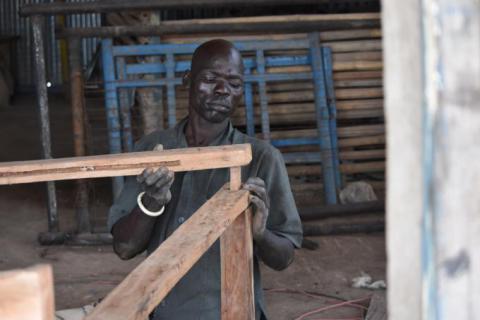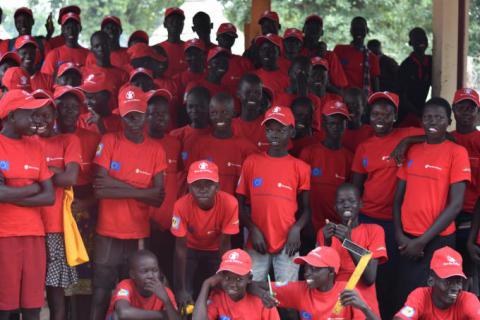From Cattle Raiding, Abject Poverty to a Positive Future
Over 900 youth in South Sudan’s Lakes State get skills to boost employment opportunities through provision of market driven services and peace building activities.
In Lakes state, lack of employable skills among the youths has resulted in foreigners providing essential services. Save the Children with support from the European Union is providing a solution that gives young people aged 14-25 essential training, education and vocational skills through the Technical Vocational Education and Training (TVET) programme in the state. It engages the youth population in activities and practical trades that lead to employment opportunities such as carpentry, masonry, computer literacy, baking, agriculture, welding, hairdressing, and dressmaking. At least 914 youth, adolescent boys and girls have been reached through the program.
The initiative reduces poverty and gives youth an alternative to join criminal activities such cattle raiding, revenge killings, road ambush and combatants.
“Let’s leave all those bad things that destroy us and focus on getting a better future”
19-year-old Dock Dongrin Gaak, once a cattle raider from Mayom County, who was imprisoned for theft had to take a decision to improve his life after he was freed from prison and continue his education. He heard about Save the Children’s Rumbek TVET, which he said was close to his uncle’s house where he was staying and joined the training immediately.
“My life changed ever since I joined this program. I feel very lucky and grateful. I hope to inspire other young girls and boys to enroll into the Centre and get skills that will change their entire life because now I am built for success.”
Marin Mayen 26, born in Amethic village in Yirol, South Sudan, was hit by polio. His both legs were paralyzed when he was eight years old and has been physically challenged since then. He uses wheel chair for moving. Mayen was born as the second child. He lost his father when he was in primary grade two. His two sisters live in the village where they farm. His wife abandoned him, as he was unable to provide for his family due to his disability.
“I have lost so much hope, but my life took a turn for the better”
In 2016, Mayen joined TVET. He studied the skills of carpentry and welding. With the skills Mayen got from TVET, life changed for the better. He was graduated in 2017 with the rest of his colleagues.
Mayen has his own business and is earning over 100 dollars per month after completing Save the Children’s EU funded TVET training. From his income, Mayen supports his sisters back in the village and his son whose mother left him when life was hard “My life is in order now. I am even planning to remarry because I have the ability to purchase some cows,” Mayen says.
The youth population has been one of the most overlooked and marginalized groups in South Sudan often regarded as perpetrators or criminals and rarely provided with education, employment opportunities or social activities. Many end up in cattle raiding and lives in the bush uprooted from their homes – and without a prospect of a quick end to the conflict, many of them could be dragged into armed forces and other types of criminality. With a third of the population displaced – most of the youth – lacking opportunities, traumatized by war, and ethnically divided. Alternatives and solutions for youth needs to be identified to avoid that the current critical situation further perpetuate and escalate the conflict.
Michael Mariel Bol, 19 years old, is the man to provide help for his two brothers and five sisters who stay in the village with his parents because he’s the first born. Mariel’s parents are farmers. He dropped out of school to cultivate local tobacco called “Macir,” in his local Dinka language, to support himself and the siblings when his parents were unable to afford his tuition fees. That couldn’t help Marial provide for his family until Save the Children trained him to earn better living for his family.
“My life has changed so much. I know I have a future now because when you have a skill no one can take it away from you. It will serve you all your life,” said Marial.
So far, the project has reached 914 youths within skills training in two years. A tracer study conducted in June 2017 indicated that 75% of 2016 graduates we engaged in employment. Currently 255 youth are receiving skills training in Rumbek TVET centre. Thanks to the European Union (EU) delegation youth empowerment program to increase access to quality TVET opportunities to vulnerable youth and children and enhance employment opportunities in South Sudan.
Save the Children, campaigning for Every Last Child in South Sudan, has been supporting and implementing Youth Empowerment program in South Sudan since 1998.
Written by: Tito Justin/Save the Children
 South Sudan
South Sudan 


